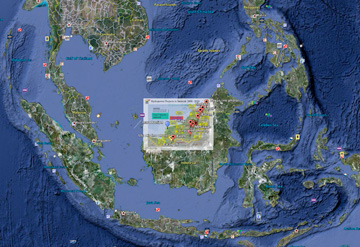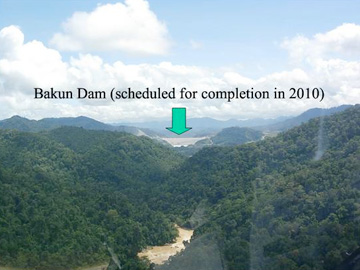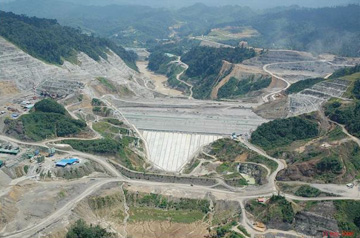Indigenous tribes in Borneo suffered a stinging defeat Thursday after Sarawak’s highest court ruled against them in 12-year-long legal battle. Tribal groups had challenged the Malaysian state government for seizing indigenous lands in order to build a massive hydroelectric power plant, dubbed the Bakun dam, but the three-person top court found unanimously against the tribes.
“It is an unfair decision. I have not been fully compensated,” said Ngajang Midin, 50, of the Ukit tribe, told the AFP as he cried. “My cocoa and pepper trees are underwater. My ancestors’ graves are buried under the sea of water.”
The $2.3 billion dollar dam has displaced over 10,000 indigenous people in its path and flooded an area of untouched rainforest the size of Singapore (around 700 square kilometers).
   Bakun dam in Sarawak. For details see David Tryse’s Flooding Borneo’s rainforest: Sarawak’s confidential dam plans 2008-2020 [Google Earth KMZ file] |
While the decision by the judges was unanimous, they cited different reasons. Only one judge dismissed the appeal because they said the government had not violated the indigenous peoples’ rights; the other two judges sided with the government largely due to technicalities.
The court did little to lift the confusion around indigenous land rights in Sarawak. The issue has flooded Sarawak courts with some 200 land rights cases currently making their way through the legal system.
The 2,400 megawatt Bakun dam could hardly be called a success story thus far. Its construction has been plagued with delays and cost overruns. The Sarawak government has argued the dam was needed to power the state, but the dam supplies twice the amount of power used in Sarawak. The additional power is planned to go to a aluminum smelter run by Cahaya Mata Sarawak (CMS) and Anglo-Australian mining giant Rio Tinto, currently in construction.
The Bakun dam is a part of Sarawak Corridor of Renewable Energy (SCORE) initiative, which will turn the state’s rivers into dammed reservoirs, and its forests into open pit mines, wood-pulp plantations, and oil palm estates. Under the initiative the state has plans to build 12 massive dams in total, even though Bakun dam alone provides ample energy for Sarawak. However, the government announced today that one of the dams, Baram dam, was being put on hold due to its impact on indigenous people. If built some 20,000 local people would need to be relocated.
According to critics, the SCORE initiative also provides plenty of opportunities for corruption.
Chief Minister of Sarawak, Adbul Taib Mahmud, who is currently under investigation by the Malaysian Anti-Corruption Commission (MACC) for alleged timber corruption, has been accused of hiding away hundreds of millions to billions of dollars in corrupt money during his 30 years of power. His family controls properties worth hundreds-of-millions of dollars throughout the world despite his annual salary of around $200,000.
The construction company, CMS, which will run the aluminum smelter and supplied materials to the Bakun dam, is closely linked to Adbul Taib Mahmud and his family.
Related articles
Wikileaks: US warned of severe corruption in Malaysia’s Sarawak state
(08/30/2011) U.S. government sources characterize the ruler of Malaysia’s Sarawak as ‘highly corrupt’ and plagued with conflicts of interest, according to secret cables released today by Wikileaks.
Sarawak reiterates goal to convert 1 million ha of forest to oil palm plantations
(07/06/2011) Despite rising criticism over deforestation and human rights abuses, Sarawak is maintaining its target of 2 million hectares of oil palm plantations by 2020, reports Malaysian state press.
Rainforest tribe forcibly removed from dam area to palm oil plantation
(06/23/2011) A thousand Penan indigenous people have been forcibly moved from their rainforest home to monoculture plantations, reports Survival International. To make way for the Murum dam, the Malaysian state government of Sarawak is moving a thousand Penan from their traditional homes, but as apart of the deal the government promised to move the Penan to another part of their ancestral land. The government has since sold that land to a palm oil company, which is currently clearcutting the forests for plantations.